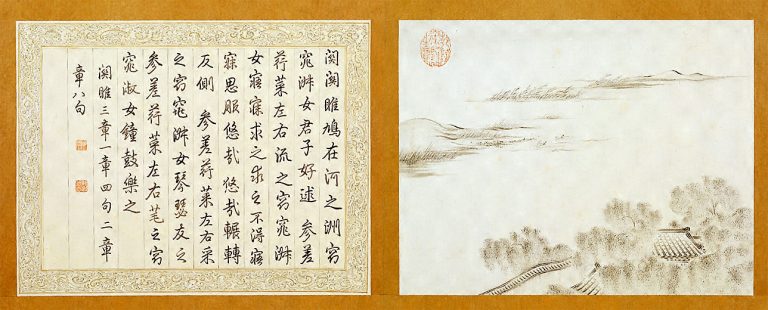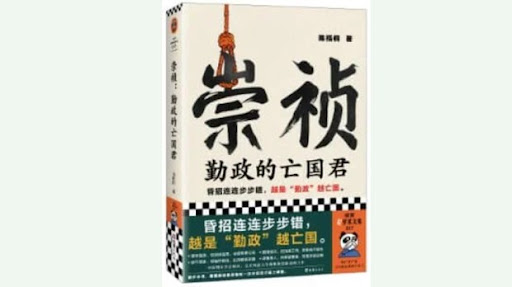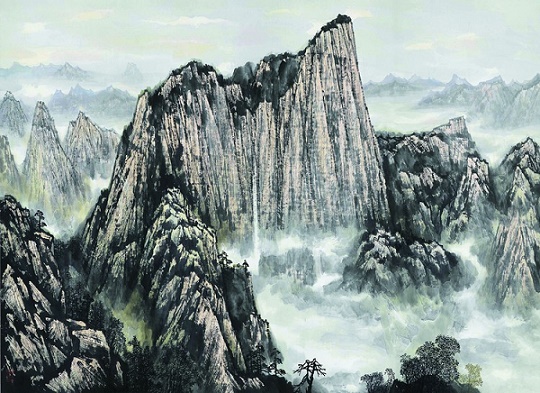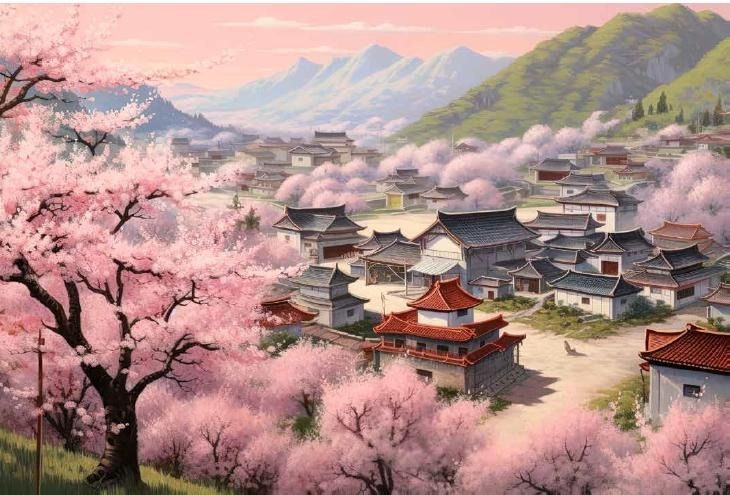The Classic of Poetry (詩經 Shijing) is China’s first collection of poems. Initially called “Poetry” or “300 poems,” it was later listed as one of the Confucian classics and called the Classic of Poetry. It collected 311 poems from the Western Zhou Dynasty to the middle of the Spring and Autumn Period.
It is comprised of three parts: Feng (風), Ya (雅), and Song (頌). “Feng” contains the songs of different areas in China during the Zhou Dynasty. Most works in “Ya” were written by aristocrats and imperial court officials. “Song” contains songs specifically used during prayer and sacrificial offerings to the royal ancestral temple.
The Classic of Poetry provides a view of the prevailing social life, morality, and style during the Zhou dynasty. It establishes the traits of Jun Zi (君子), the quintessential gentleman who emphasizes cultivating his moral character. It reflects ancient China’s view of the unity of nature and man, and promotes kind hearted, simple, and honest behavior.
The Classic of Poetry captures Zhou dynasty society’s diversity through astronomy, geography, politics, economy and more. This literary classic is written mainly in four character lines. Using simple language, it expresses a volume of ideas and information regarding morality and etiquette.
The Classic of Poetry emphasizes the cultivation of virtue and following the will of heaven. By cultivating virtue one can elevate one’s realm of morality and achieve the goal of following the will of heaven. “Song of Zhou” (周頌 Zhōu sòng) and “Daya” (大雅 Dà yǎ) describe how the ancestors of the Zhou dynasty made continual efforts to improve their virtue, respect heaven and pray to gods. Heaven blessed them in return.
Success
You are now signed up for our newsletter
Success
Check your email to complete sign up
King Wen of Zhou cultivated himself and loved the people; his virtues were righteous and did not violate the will of Heaven, so nearby ethnic groups surrendered to him. King Wu of Zhou (周武王 Zhōu Wǔ Wáng) inherited his father’s aspiration, governing the country with virtue and in harmony with nearby ethnic groups. Duke Wen of Zhou (周公旦 Zhōu Gōng Dàn) “followed the Way of Heaven” and created a system of etiquette and music to regulate people’s behavior and cultivate morality. King Cheng of Zhou (周成王 Zhōu Chéng Wáng) promoted virtues and was loved by the people.
The people of the Zhou dynasty (The Zhou people) believed that gods supervised the world with mighty power and kept divine order. The Classic of Poetry reads, “kings, like gods, examine the country and supervise nearby regions to know people’s suffering.” The Zhou people required themselves to be like King Wen of Zhou, to cultivate virtue and be good at self-reflection so that everything they did would follow the will of Heaven.
The Zhou people believed that everyone who comes to this world must think about their true missions on Earth, following the destiny dictated by Heaven. One must distinguish right from wrong, and choose the good. Only the virtuous can receive gods’ favor and blessings. Respect for the mightiness of Heaven ensures safety and peace. “I respect Heaven’s mightiness, day and night are blessed,” reads the Classic of Poetry.
The Classic of Poetry guided people in etiquette. The poems in “Song” were mainly used in sacrifices or essential ceremonies. It also had the role of education. It includes the earliest poems which praise teachers. Confucius said, “If one does not learn ‘Poetry,’ one will not know how to speak properly in society.” He said, “‘300 poems’ can be concluded as ‘thoughts without any evil.’”
Confucius often educated his students with poetry, including The Classic of Poetry, emphasizing virtue and morality. With the specific forms of poetry, calligraphy, etiquette, and music; moral principles subtly penetrated the people’s hearts. The poetry encouraged people to be kind, honest, and simple; it regulated the ethical relations between emperors and officials, fathers and sons, brothers and friends with morality; leading them to cultivate themselves, govern the country well, and be at peace with nearby ethnic groups.
The Classic of Poetry has an important place in traditional Chinese culture and world history, contributing rich philosophical thought and artistry. It established a time-honored tradition of Chinese poetry and greatly influenced the literature of later generations. Traditional Chinese culture recognized and abided by the Classic of Poetry‘s guiding principles, which enlightened people to pursue harmony through the unity of heaven and humankind. It represents people’s pursuit of the supreme truth, admiration for the virtuous, and yearning for bright and righteous deeds.













